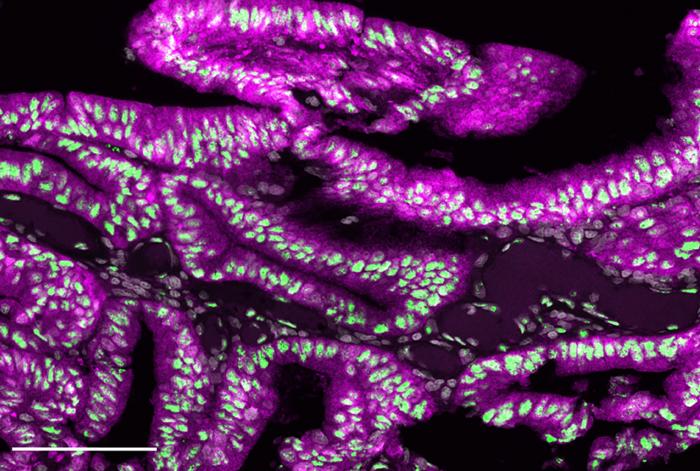Hard-to-detect colorectal pre-cancerous lesions known as serrated polyps, and the aggressive tumors that develop from them, depend heavily on the ramped-up production of cholesterol, according to a preclinical study from researchers at Weill Cornell Medicine. The finding points to the possibility of using cholesterol-lowering drugs to prevent or treat such tumors.

Credit: Anxo Martinez-Ordoñez
Hard-to-detect colorectal pre-cancerous lesions known as serrated polyps, and the aggressive tumors that develop from them, depend heavily on the ramped-up production of cholesterol, according to a preclinical study from researchers at Weill Cornell Medicine. The finding points to the possibility of using cholesterol-lowering drugs to prevent or treat such tumors.
In the study, published Oct. 13 in Nature Communications, the researchers analyzed mice that develop serrated polyps and tumors, detailing the chain of molecular events in these tissues that leads to increased cholesterol production.
They confirmed their findings in analyses of human serrated polyps and tumors, and showed in mouse models that replicate the human cancer that blocking cholesterol production prevented the progression of these types of intestinal tumors.
“Serrated-type polyps and tumors currently are not treated differently from other colorectal neoplasias, but as our work shows, they have this specific metabolic vulnerability that can be targeted,” said study co-senior author Dr. Jorge Moscat, a Homer T. Hirst III Professor of Oncology in Pathology, Vice-Chair for Cell and Cancer Pathobiology in the Department of Pathology and Laboratory Medicine and a member of the Sandra and Edward Meyer Cancer Center at Weill Cornell Medicine.
The other co-senior author is Dr. Maria Diaz-Meco, also a Homer T. Hirst III Professor of Oncology in Pathology and a member of the Meyer Cancer Center at Weill Cornell Medicine. The study’s first author is Dr. Yu Muta, a postdoctoral associate in the Moscat/Diaz-Meco laboratories.
Cholesterol is generally considered a pro-growth molecule, being a building block for cell membranes and having other growth-supporting functions. Prior studies have linked high blood cholesterol levels to various cancers, including colorectal cancers. However, it hasn’t been clear that lowering cholesterol, for example with common statin drugs, can prevent colorectal cancers.
“Trials of statins to prevent colorectal cancer have had conflicting results,” Dr. Diaz-Meco said. “Our findings suggest that this is because targeting cholesterol has a preventive but selective effect only against polyps and tumors of this serrated type.”
Serrated polyps are so-called because of their sawtooth appearance under a microscope. They are flatter than ordinary colorectal polyps and can often be missed during colonoscopies. Yet the tumors into which they develop, which account for roughly 15 to 30 percent of colorectal cancers, contain many “metaplastic” cells that are particularly invasive and resistant to treatments.
Several years ago, the Moscat/Diaz-Meco team linked serrated polyps and tumors to low levels of two enzymes known as aPKCs. They showed that mice engineered to lack these aPKC enzymes in their gut linings reliably form serrated polyps and then aggressive tumors.
In the new study, the scientists found that in serrated-type tumors in these mice, and even in intestinal tissue poised to develop these types of cancerous lesions, cholesterol synthesis was strikingly upregulated, suggesting that cholesterol may be an early driver of tumor development.
The researchers revealed how the absence of aPKC enzymes, especially in metaplastic tumor cells, unleashes the activation of a transcription factor called SREBP2, which switches on cholesterol production. Tests on colorectal polyp and tumor samples from human patients dovetailed with the mouse findings. They found, for example, that only serrated-type tumors had low aPKC levels concomitant with the accumulation of SREBP2, a driver and a marker of upregulated cholesterol biosynthesis in the serrated cancer cells.
Lastly, the researchers tested a combination of two cholesterol synthesis-blocking drugs, including the widely used atorvastatin. The treatment, delivered when the low-aPKC mice were still quite young, significantly lowered the rate at which both serrated polyps and tumors later formed—and the serrated-type tumors that did form were less aggressive than those normally arising in the untreated mice.
The results indicate that targeting cholesterol could be a viable strategy for treating and preventing serrated-type colorectal tumors. The Moscat and Diaz-Meco labs are now hoping to set up an initial clinical trial of a cholesterol-lowering intervention in patients from whom serrated colorectal polyps have been removed.
“Currently when these polyps are detected early with colonoscopy, they are removed and patients have to hope that they don’t come back,” Dr. Moscat said. “In the future, we hope to have a more active method to prevent this very aggressive form of cancer before it is fully developed and more difficult to treat.”
Many Weill Cornell Medicine physicians and scientists maintain relationships and collaborate with external organizations to foster scientific innovation and provide expert guidance. The institution makes these disclosures public to ensure transparency. For this information, see profile for Dr. Jorge Moscat and Dr. Maria Diaz-Meco.
This research was supported in part by grants from the National Cancer Institute of the National Institutes of Health under award numbers: R01CA265892, R01CA250025, R01CA275846, R01CA246765, R50CA265332, R50CA252146, and R01CA234245. Project support for this research was provided in part by the European Union Horizon’s 2020 Grant (REVERT project GA848098), and the Center for Translational Pathology in the Department of Pathology and Laboratory Medicine at Weill Cornell Medicine.
Journal
Nature Communications




